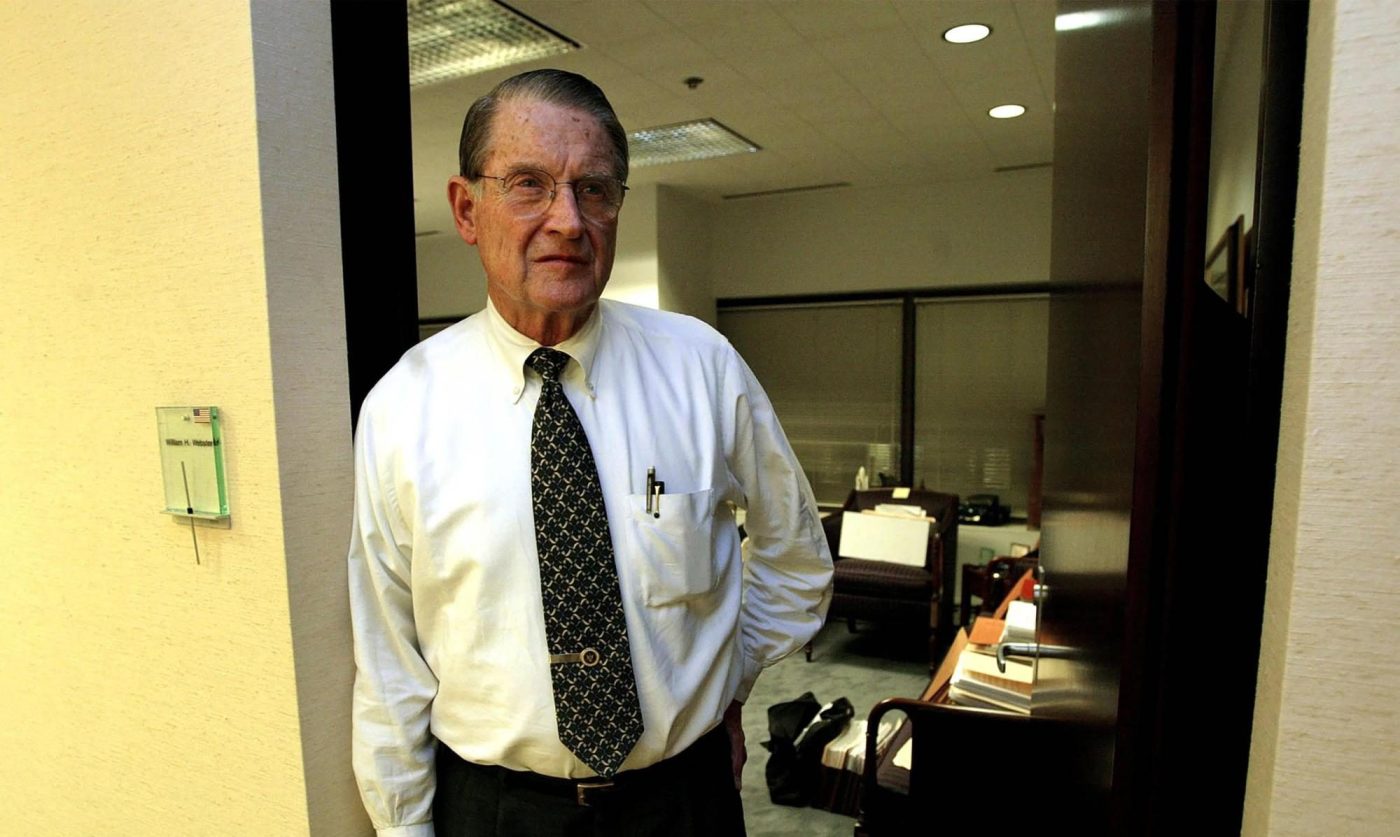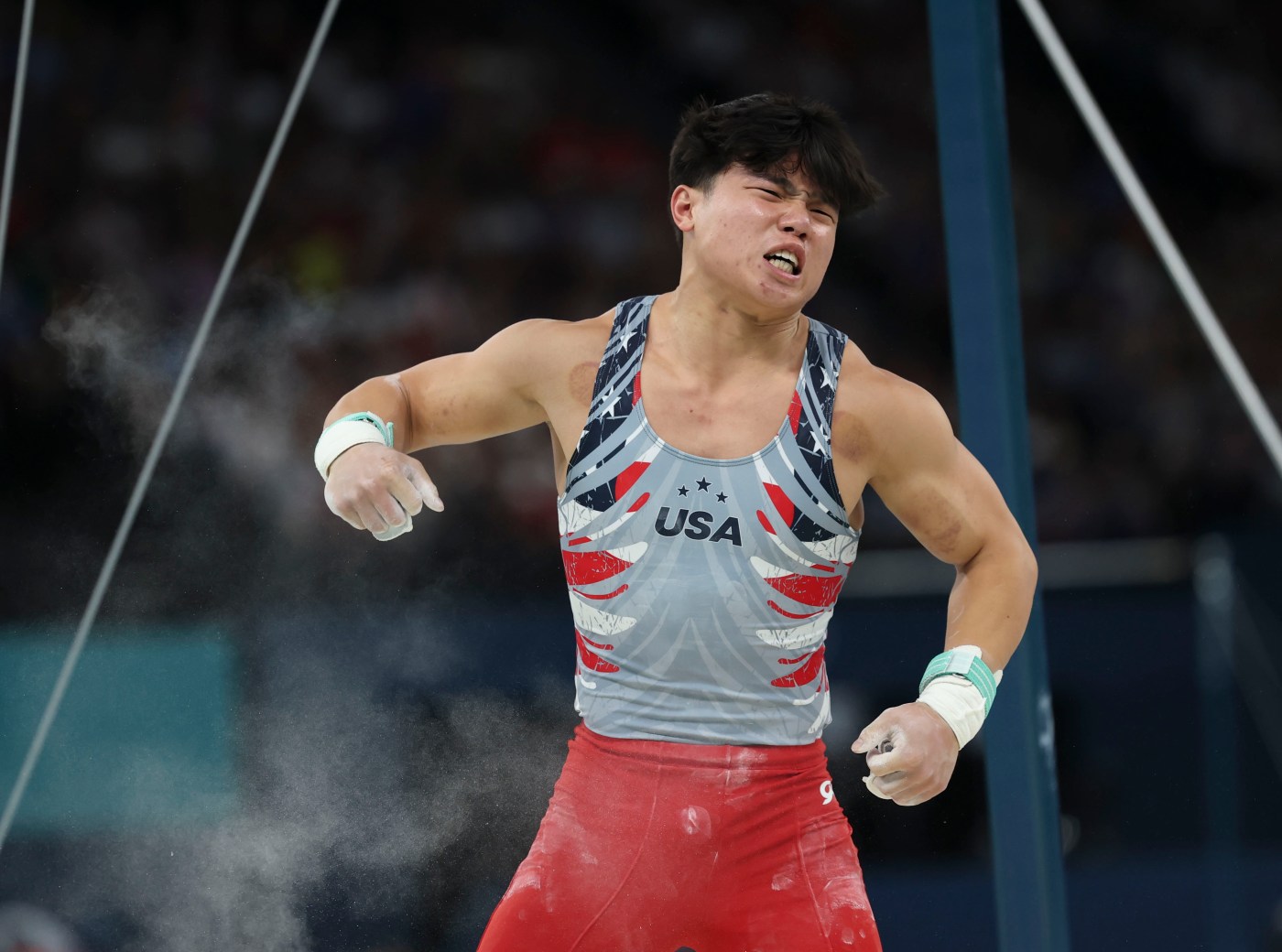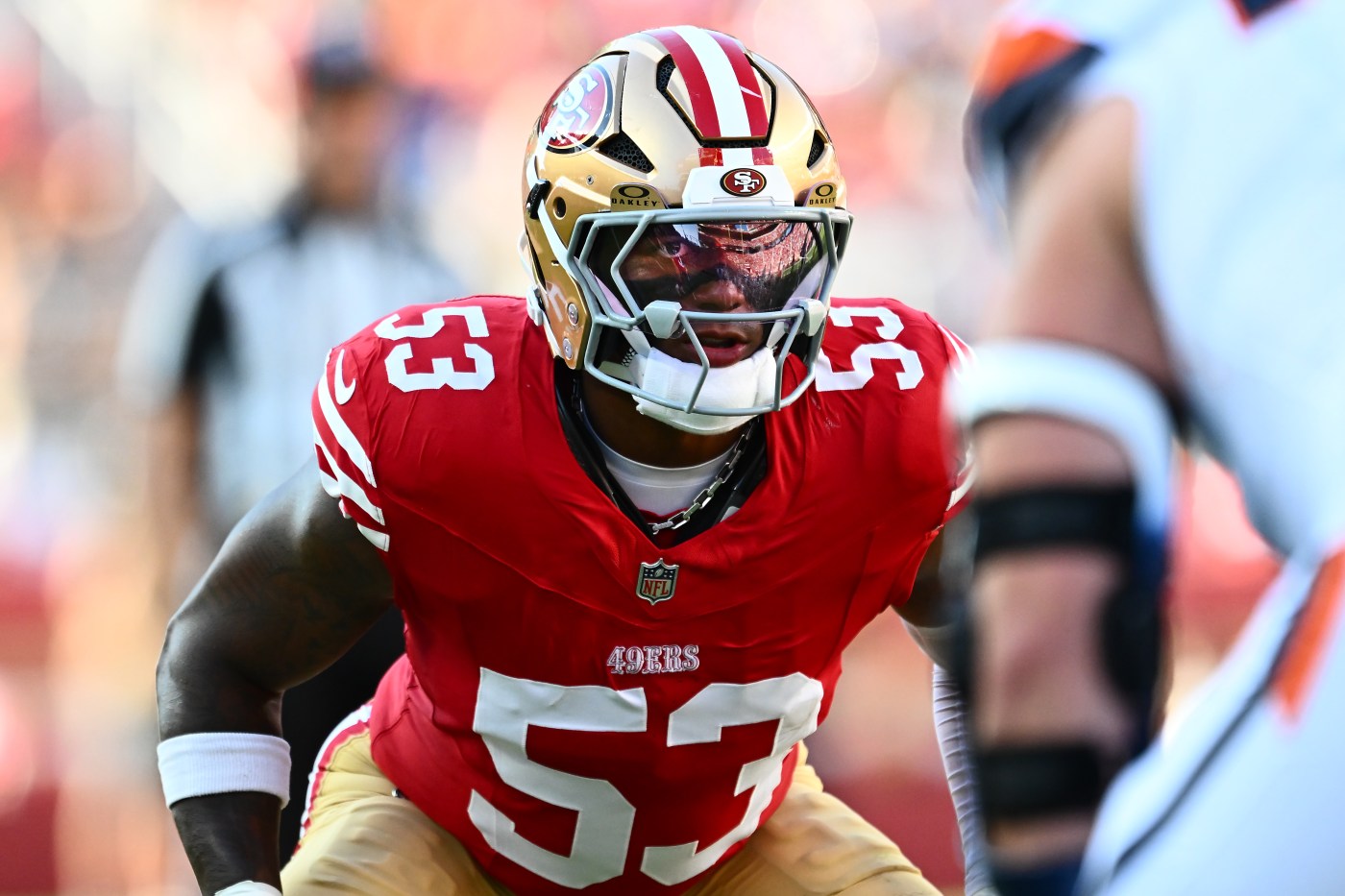William H. Webster, the only person ever to lead the FBI and the CIA, switching from lawman to spymaster while the bureau was investigating high crimes at the White House and the CIA, died Friday in Warrenton, Virginia. He was 101.
A family spokesperson, Jim McGrath, confirmed the death, at a care center, but did not specify a cause.
Related Articles
Former FBI and CIA Director William H. Webster dies at 101
James Lovell dies at 97; Apollo 13 moon mission leader turned ‘potential tragedy into a success’
Packers star Billy Howton, believed to have been the oldest living NFL player, dies at 95
Eddie Palmieri dies at 88; Grammy-winning musician was a pioneer of Latin jazz
‘The Walking Dead’ actress Kelley Mack dies at 33
Webster was born two months before J. Edgar Hoover took command of the FBI in 1924. Hoover, who governed the bureau for almost half a century, was not yet six years in his grave when Webster was sworn in as the FBI’s third director on Feb. 23, 1978, a time when Hoover’s long shadow still darkened Washington.
Senate hearings had exposed the bureau’s Cold War history of warrantless wiretaps and burglaries and laid bare its vendettas against the Rev. Martin Luther King Jr.
The FBI, America’s leading law enforcement agency, was widely seen as lawless and malicious. Six weeks after Webster took office, a federal grand jury, citing a “conspiracy to injure and oppress citizens” with illegal break-ins against the friends and families of far-left fugitives, indicted L. Patrick Gray III, the former acting FBI director; Edward S. Miller, the former FBI intelligence chief; and Mark Felt, the former deputy director who was later revealed as Deep Throat, The Washington Post’s secret Watergate source. (Gray’s indictment was later dropped by the Justice Department. Miller and Felt were fined and later pardoned by President Ronald Reagan.)
President Jimmy Carter chose Webster — a federal judge, a moderate Republican and a Christian Scientist — in large part because he projected probity and integrity, qualities that matched the president’s self-image. At his swearing-in, Webster vowed to “do the work that the American people expect of us in the way that the Constitution demands of us.”
Webster later said that it took several years before he could control “the Hoover hard hats,” as he called the old guard, and wrestle the bureau into the realm of the rule of law.
He did his best to impose his will on a hidebound hierarchy. Mild-mannered and soft-spoken in public, he could be as hard-minded and sharp-tongued as Hoover when dressing down subordinates. His chin would jut, and his “steely blue eyes” would glare, Homer Boynton, his chief administrative aide, recalled. “He could be brutal.”
He had to be. A bureau hewing to the Hoover tradition might not survive long. In Webster’s nine years in office, with a few notable exceptions, the FBI stopped breaking the law in the name of the law.
Another signal achievement was the Abscam case, an audacious sting aimed at corrupt politicians in Congress and city halls. Working with a convicted swindler, FBI agents posed as representatives of an Arabian company offering bribes for political favors. A senator and six House members were among those videotaped taking the bait. One of them, Rep. John Jenrette, D-S.C., told an agent, “I’ve got larceny in my blood. I’d take it in a goddamn minute.” Juries were quick to convict.
Webster wasn’t entirely comfortable with undercover stings. He did not wish to run a secret police force. “I did not want to turn the bureau into a Gestapo organization,” he said in an official FBI oral history. “But there were times when the undercover operation was the only way.”
As a lawyer, he wanted bright lines defining the bureau’s legal limits. He was astonished upon taking office to discover that the FBI had no charter — no legal certification from Congress defining its duties. (It never had one. It still doesn’t.) He spent two years drafting one, but his work was stillborn.
In 1980, Webster added terrorism to the list of his “top priorities” at the FBI. “The objective was to develop intelligence on terrorist groups and to deal with them effectively before the bomb went off,” he later said.
He also worried that the bureau lacked the counterintelligence abilities to meet the threat of espionage. He had ample cause for concern.
While Reagan, who took office in January 1981, was opposing communism abroad, American turncoats were stealing secrets for the communists. The intelligence services of Russia and its allies had penetrated the military-industrial complex of the United States. Webster’s FBI uncovered at least 68 Americans working for Moscow. But it failed for many years to detect two of the worst spies in American history, who ran rampant at the FBI and the CIA.
Starting in 1985, Robert Hanssen, a Soviet counterintelligence supervisor at the FBI, handed the KGB a list of the bureau’s most sensitive operations against Moscow, including the fact that the FBI was tunneling under the new Soviet Embassy to tap into its communications; the methodologies the United States used to spy on the Soviets; and the nation’s plans for continuity of government if Washington and Moscow started a third world war. In a postmortem on the Hanssen case, Webster called it “a 500-year flood” that ruined everything in its path at the FBI.
That same year, Aldrich Ames, chief of the CIA’s Soviet counterintelligence branch, sold out the dozen Soviet spies who worked in secret for the United States. Ames, arrested in 1994, is serving a life sentence without parole. Hanssen, arrested in 2001, died in prison in 2023.
Arms for Hostages
In late November 1986, the biggest White House crisis since Watergate exploded. With Reagan’s knowledge, CIA leaders and National Security Council officers had been running lethal weapons to Iran’s Revolutionary Guard in hopes of freeing American hostages in Lebanon. Then they deliberately overcharged the Iranians by as much as 600% and skimmed the money to finance anti-communist rebels in Central America, the Contras, in defiance of a congressional ban.
The president’s favorite gung-ho Marine, Lt. Col. Oliver North of the security council staff, later testified that this had been “a neat idea.”
An independent counsel found that Reagan, his secretary of defense, his CIA director, his national security advisers, North and others had skirted or broken the law. The evidence was gathered by FBI agents, who interrogated the president’s top aides and the CIA’s chieftains, searched the security council’s offices and, in a remarkable feat of forensics, recovered and restored the backup tapes for the top-secret White House email system, which recorded the arms sales and the diversion of funds.
The investigation was greatly complicated when the CIA director, William J. Casey, a key figure in the so-called Iran-Contra conspiracy, collapsed from lymphoma three weeks after the scandal broke. By then, three dozen FBI agents were thumbing through classified files at CIA headquarters, seeking evidence of crimes. Leaders of the clandestine service were deeply implicated.
Casey died May 6, 1987, hours after the first witness in congressional hearings on the Iran-Contra affair named him as having assisted in the arms sales. On May 26, Webster became the new chief of U.S. intelligence.
He faced fierce resistance from the old guard, always wary of outsiders. “All of his training as a lawyer and a judge was that you didn’t do illegal things,” Duane R. Clarridge, a senior CIA officer enmeshed in Iran-Contra, later wrote. “He could never accept that this is exactly what the CIA does when it operates abroad. We break the laws of their countries.”
Webster judged Clarridge unfit to serve his country. He forced him out, fired two other senior officers who led the secret war on communism in Central America, and reprimanded three others for lying to Congress and the CIA’s inspector general about their conduct. He asked an Amherst College classmate, Richard Stolz, to return from retirement and run the CIA’s clandestine service so he could have someone he trusted running covert operations.
Webster’s command was sharply curtailed after George H.W. Bush became president in January 1989. Bush ran the CIA in 1976 and, as commander in chief, acted as his own spymaster, calling up station chiefs around the globe for their news.
Panama proved a breaking point. The country was led by Gen. Manuel Noriega, the corrupt dictator and anti-communist ally of U.S. intelligence, who was wanted in the United States on cocaine-trafficking charges. Bush ordered him overthrown. But Webster’s CIA appeared unwilling or unable. A military invasion was needed. Begun on Dec. 20, 1989, the assault left 23 American soldiers and hundreds of civilians dead before Noriega was arrested.
The president let it be known that he was learning more about Panama from CNN than from the CIA, and with that, Webster’s authority was effectively ended.
Thereafter, the president, Defense Secretary Dick Cheney and the deputy national security adviser, Robert M. Gates, took command and control over U.S. intelligence in the run-up to the January 1991 war against Saddam Hussein’s Iraq. Gates took over the agency in November 1991, after Webster was eased out by the White House.
It was a hard time for the nation’s spies, who were being denounced, rightly or wrongly, for missing clear signs of the decline and fall of the Soviet Union. Only after the Ames and Hanssen cases came to light was it clear that the betrayals had led to deeply distorted assessments of Moscow, blinding American leaders to the greatest geopolitical event of the late 20th century.
Son of Missouri
William Hedgcock Webster was born in St. Louis on March 6, 1924, the son of Thomas and Katherine (Hedgcock) Webster. He grew up in Webster Groves, a St. Louis suburb. His father owned farmland and several small businesses.
Webster went to Amherst College in Massachusetts on a scholarship but interrupted his studies to join the Navy when World War II broke out. After his discharge, he returned to Amherst, graduating in 1947. Two years later, he earned a law degree from Washington University in St. Louis and began practicing law. In 1950, he was recalled to active duty in the Korean War.
As a Navy lawyer, Webster, a lieutenant, represented a sailor accused of stealing batteries. His client had not been advised of his right to counsel before he was interrogated. Webster instructed him to remain silent. As a result of his adherence to the rule of law, the right to counsel became part of the Uniform Code of Military Justice.
In 1950, Webster married Drusilla Lane, who became known for her volunteer work in St. Louis and the Washington area; she died at 57 in 1984. He is survived by his second wife, Lynda (Clugston) Webster, and three children from his first marriage: two daughters, Drusilla Patterson and Katherine Roessle, and a son, William Jr. He is also survived by seven grandchildren and 12 great-grandchildren.
President Richard M. Nixon chose Webster as a U.S. District Court judge in 1970 and in 1973 elevated him to the 8th U.S. Circuit Court of Appeals, covering Arkansas, Iowa, Minnesota, Missouri, Nebraska, North Dakota and South Dakota.
Notably, Webster joined a ruling that the University of Minnesota could not deny recognition to a campus organization supporting gay rights. He also supported a suit by women on the Fargo, North Dakota, police force who were paid 50% less than men with comparable duties.
Late in life, Webster cut an elegant figure in pinstripes and wingtips behind his desk at the Washington offices of the powerful law firm Milbank, Tweed, Hadley & McCloy. His specialties in his legal practice, which he continued well past age 90, included arbitration and negotiation.
In 2014, Webster made headlines again when he and his wife became the target of a Jamaican scam in which a caller, not knowing that he had reached a former FBI director, said that Webster had won $72 million in a lottery sweepstakes but that he needed to send him $50,000 in taxes and handling fees. When the Websters repeatedly declined, the scammer threatened them with physical harm. Webster helped FBI agents track down the scammer, who was convicted and sent to prison. Afterward, Webster videotaped a public service announcement warning against elder fraud.
In 2018, during President Donald Trump’s first term, Webster made a rare political statement when he signed a letter, along with a dozen other former CIA directors and deputy directors, that criticized Trump for retaliating against John O. Brennan, a former CIA chief, by revoking his security clearances. Brennan had criticized Trump; he had also participated in the early stages of investigating Russia’s role in Trump’s election.
And in a New York Times guest essay, Webster denounced “destructive” attacks on the investigation by Robert Mueller, the special counsel. “Faith in the justice system and in our intelligence agencies cannot be collateral damage in a partisan grudge match,” he wrote.
In an interview with the Times in 2005, Webster reflected on the outcome of an immense covert operation that many saw as the CIA’s greatest victory: its shipments of billions of dollars of weapons to the mujahideen, the Islamic warriors who fought the Soviet invaders of Afghanistan in the 1980s.
In February 1989, the Soviets left. So did the CIA.
But the Afghan jihad went on. The Taliban seized power and gave safe harbor to Osama bin Laden and al-Qaida. After the 9/11 attacks, the United States spent 20 years at war in Afghanistan; its enemies included some who had once fought the Red Army. In the end, the Americans would join the Soviets among the great powers defeated by Afghanistan.
“We walked away from it,” Webster said. “We should not have walked away.”
In conversation, Webster revealed a cautious and precise mind — as well as the ethos of that vanishing political species, the moderate Republican. He was polite and affable, proud of what he had accomplished, yet modest to a fault.
In a 2002 oral history interview for the Miller Center at the University of Virginia, he remarked, “When people say I’m the only person who has ever been both the FBI director and the CIA director — and for that many years — I say, ‘Yes, the proof of the pudding is whether they ever have another one or not.’”
This article originally appeared in The New York Times.





